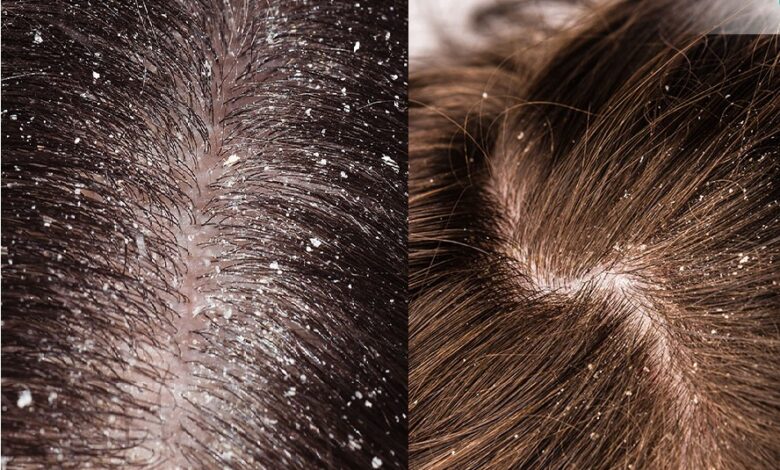Say Goodbye to Snowfall: Understanding What Causes Dry Scalp and Dandruff

Dry scalp and dandruff are two common yet distinct conditions that affect the health and appearance of the scalp and hair. While they share some similarities, it’s essential to understand their definitions, symptoms, and differences to address them effectively.
Dry Scalp
A dry scalp is characterized by a lack of moisture and natural oils (sebum) on the scalp’s surface. This condition can lead to itching, flaking, and a tight, uncomfortable sensation. A dry scalp is often caused by environmental factors, such as cold weather, low humidity, or excessive use of harsh hair products.
Dandruff
Dandruff, on the other hand, is a more complex condition caused by a fungal overgrowth called Malassezia. This fungus feeds on the excess oils (sebum) on the scalp, leading to scalp inflammation, itching, and the formation of visible white or yellowish flakes. Dandruff can be chronic or recurrent, and it may be exacerbated by factors like stress, hormonal changes, and certain medical conditions.
Symptoms
While both dry scalp and dandruff can cause itching and flaking, there are some distinct differences in their symptoms:
- Dry scalp flakes are typically smaller, whiter, and drier, resembling fine dandruff.
- Dandruff flakes are larger, greasier, and often yellowish or grayish.
- A dry scalp may cause a tight, uncomfortable sensation, while dandruff is more likely to cause scalp redness and irritation.
- Dandruff can be accompanied by an oily or greasy appearance of the scalp and hair.
Sebum Production and Scalp Health
Sebum, the skin’s natural oil produced by sebaceous glands, plays a crucial role in maintaining scalp health. It helps to lubricate and waterproof the scalp, preventing it from becoming dry and flaky. Sebum also has antimicrobial properties that protect the scalp from harmful microorganisms.
However, an imbalance in sebum production can lead to scalp issues like dry scalp or dandruff. Insufficient sebum production can result in a dry, itchy scalp, while excessive sebum can create an environment conducive to the overgrowth of the fungus Malassezia, which can contribute to dandruff formation.
Several factors can influence sebum production, including:
- Hormones: Hormonal changes during puberty, menstruation, pregnancy, and menopause can affect sebum production levels
- Genetics: Some individuals may have a genetic predisposition to producing more or less sebum.
- Stress: High-stress levels can increase sebum production, leading to oily scalp conditions.
- Medications: Certain medications, such as birth control pills, can disrupt the balance of hormones and sebum production.
- Age: Sebum production tends to decrease as we age, leading to drier scalp conditions in older adults.
Maintaining a healthy balance of sebum is essential for preventing dry scalp and dandruff. Proper scalp care, including gentle cleansing and moisturizing, can help regulate sebum levels and promote a healthy scalp environment.
Environmental Factors
One of the primary environmental factors that can contribute to dry scalp and dandruff is climate. Living in extremely dry or cold conditions can strip the scalp of its natural oils, leading to dryness, flaking, and irritation. Conversely, hot and humid environments can promote excessive sweating, which can disrupt the scalp’s pH balance and create an ideal environment for fungal growth, potentially leading to dandruff.
Air pollution, particularly in urban areas, is another significant environmental factor that can exacerbate dry scalp and dandruff. Pollutants like smoke, dust, and chemical particles can accumulate on the scalp, clogging pores and disrupting the natural shedding process of dead skin cells. This buildup can lead to irritation, inflammation, and the formation of unsightly flakes.
The use of harsh grooming products, such as shampoos containing sulfates, parabens, and other drying agents, can strip the scalp of its natural oils, leading to dryness and flaking. Additionally, overuse of hair styling products like gels, mousses, and hairsprays can leave residue on the scalp, causing buildup and potentially contributing to dandruff.
Skin Conditions and Diseases
Certain skin conditions and diseases can contribute to dry scalp and dandruff. Eczema, a chronic inflammatory skin condition, can cause dry, itchy, and flaky patches on the scalp. When eczema affects the scalp, it is known as seborrheic dermatitis. This condition can lead to excessive shedding of dead skin cells, resulting in dandruff.
Psoriasis, another autoimmune skin disorder, can also manifest on the scalp. Scalp psoriasis causes red, itchy, and scaly patches, which can be mistaken for severe dandruff. The excess shedding of skin cells and inflammation associated with psoriasis can lead to a dry, flaky scalp and dandruff.
Other skin conditions like seborrheic dermatitis, a form of eczema, and cradle cap in infants can also contribute to dry scalp and dandruff. These conditions disrupt the normal shedding process of the skin, leading to an accumulation of dead skin cells on the scalp.
Diet and Nutrition
A balanced and nutrient-rich diet plays a crucial role in maintaining a healthy scalp and preventing dryness and dandruff. Certain nutrient deficiencies can contribute to scalp issues and exacerbate dandruff formation.
Deficiencies in essential fatty acids, such as omega-3 and omega-6, can lead to a dry scalp and increased dandruff production. These fatty acids are vital for maintaining the skin’s natural oil barrier and preventing moisture loss. Incorporating foods like fatty fish, nuts, seeds, and plant-based oils into your diet can help ensure an adequate intake of these nutrients.
Vitamin deficiencies, particularly vitamins B6, B12, and zinc, have also been linked to dandruff and scalp health. These vitamins and minerals are essential for proper skin cell regeneration and maintaining a healthy scalp environment. Good sources of these nutrients include whole grains, leafy green vegetables, lean proteins, and fortified foods.
Stress and Hormonal Imbalances
Stress and hormonal imbalances can significantly contribute to dry scalp and dandruff. When the body experiences prolonged periods of stress, it triggers the release of hormones like cortisol, which can disrupt the natural balance of the skin’s microbiome and oil production.
Elevated cortisol levels can lead to an increase in sebum production, resulting in an oily scalp prone to dandruff. Conversely, stress can also cause a decrease in sebum production, leading to a dry and flaky scalp. This imbalance in sebum levels creates an ideal environment for the overgrowth of fungi like Malassezia, which is a common cause of dandruff.
Hormonal fluctuations, particularly during puberty, pregnancy, and menopause, can also contribute to scalp dryness and dandruff. These hormonal changes can affect the skin’s oil production, causing either excessive oiliness or dryness, both of which can lead to scalp irritation and flaking.
Fungal Infections
Dandruff is often caused by a type of fungus called Malassezia, which naturally occurs on the scalp. This fungus feeds on the oils produced by the scalp, and an overgrowth can lead to excessive shedding of skin cells, resulting in the white, flaky buildup known as dandruff.
Malassezia is a lipophilic fungus, meaning it thrives in oily environments. When there is an excess of sebum (oil) on the scalp, it creates an ideal environment for Malassezia to proliferate. The fungus then breaks down the sebum, producing oleic acid, which can irritate the scalp and trigger an inflammatory response, leading to increased skin cell turnover and dandruff formation.
Certain factors can contribute to the overgrowth of Malassezia, including hormonal changes, stress, a weakened immune system, and the use of certain hair products or medications. People with oily hair or scalp conditions like seborrheic dermatitis may also be more susceptible to Malassezia-related dandruff.
While Malassezia is the primary culprit behind dandruff, other fungi, such as Candida, can also contribute to scalp issues and dandruff-like symptoms. Maintaining a healthy scalp environment and using anti-fungal shampoos or treatments can help control fungal overgrowth and alleviate dandruff problems.
Hair Care Routine
Improper hair washing, brushing, and styling habits can disrupt the scalp’s natural oil balance, leading to dryness and dandruff. Infrequent shampooing allows oils, dead skin cells, and product buildup to accumulate, creating an ideal environment for dandruff-causing fungi. On the other hand, over-shampooing strips the scalp of its protective oils, causing dryness and irritation.
Harsh brushing or excessive hair styling with hot tools like blow dryers, flat irons, and curling wands can also damage the scalp and hair cuticles, leading to dryness and flaking. Tight hairstyles that pull on the scalp, such as braids or ponytails, can cause irritation and inflammation, exacerbating dandruff problems.
Using the wrong hair products, such as those containing harsh chemicals, fragrances, or alcohol, can disrupt the scalp’s pH balance and strip away natural oils, contributing to dryness and dandruff. Additionally, failing to rinse out hair products thoroughly can lead to buildup and clogged hair follicles, creating an ideal breeding ground for dandruff-causing fungi.
Age and Hormonal Changes
As we age, our bodies undergo various hormonal shifts that can impact the health and condition of our scalp. One of the most significant changes is a decrease in the production of hormones like estrogen and testosterone. These hormones play a crucial role in regulating sebum production, which is the natural oil secreted by the sebaceous glands in the scalp.
Sebum helps to keep the scalp moisturized and prevents dryness, flakiness, and dandruff. However, when hormone levels decline, sebum production can decrease, leading to a dry and irritated scalp. This dryness can cause the skin on the scalp to become flaky, itchy, and prone to dandruff.
Additionally, aging can also affect the skin’s ability to retain moisture, further exacerbating the issue of dry scalp. As we grow older, the skin’s natural barrier function can become compromised, making it more susceptible to water loss and environmental factors that can contribute to dryness.
Hormonal changes during menopause can also play a role in the development of dry scalp and dandruff. The fluctuations in estrogen levels during this time can disrupt the scalp’s natural oil production, leading to dryness and irritation.
It’s important to note that while age and hormonal changes are common contributors to dry scalp and dandruff, they are not the only factors.
Genetic Factors
Genetic predisposition plays a significant role in an individual’s susceptibility to dry scalp and dandruff. These conditions can run in families, suggesting that certain inherited traits or tendencies may increase the risk of developing scalp issues.
One of the primary genetic factors linked to dry scalp and dandruff is the overproduction or underproduction of sebum, the natural oil secreted by the sebaceous glands in the scalp. Individuals with a genetic tendency to produce less sebum may experience a drier scalp, leading to flaking and dandruff. Conversely, those who overproduce sebum may be more prone to oily scalp conditions, which can also contribute to dandruff formation.
Additionally, genetic variations in the immune system’s response to certain fungi, such as Malassezia, which is commonly associated with dandruff, can influence an individual’s susceptibility. Some people may have a heightened inflammatory response to these fungi, leading to increased scalp irritation and dandruff production.
Inherited skin conditions, like seborrheic dermatitis or psoriasis, can also predispose individuals to dry scalp and dandruff. These conditions often have a genetic component and can cause scalp inflammation, dryness, and flaking.
Furthermore, genetic factors may influence the skin’s natural shedding process, known as desquamation. Individuals with a genetic tendency for excessive or irregular desquamation may experience more frequent or severe dandruff.
Medical Treatments and Side Effects
Certain medications can disrupt the delicate balance of the scalp and lead to dryness, irritation, and dandruff. Medications that are known to cause dry scalp and dandruff as side effects include:
- Antidepressants: Certain antidepressants, such as selective serotonin reuptake inhibitors (SSRIs) and tricyclic antidepressants, can interfere with the production of sebum, leading to a dry and flaky scalp.
- Blood Pressure Medications: Diuretics and beta-blockers, commonly prescribed for high blood pressure, can reduce the amount of sebum produced by the scalp, resulting in dryness and dandruff.
- Cholesterol-Lowering Medications: Statins, used to lower cholesterol levels, can sometimes cause scalp irritation, dryness, and dandruff as a side effect.
- Chemotherapy Drugs: Cancer patients undergoing chemotherapy often experience scalp dryness and dandruff due to the harsh effects of the drugs on the body’s cells and hair follicles.
- Retinoids: Topical retinoids, used for treating acne and other skin conditions, can cause scalp dryness and flaking when applied to the scalp area.
- Immunosuppressants: Medications that suppress the immune system, such as those used in organ transplant patients or for autoimmune disorders, can disrupt the scalp’s natural balance and lead to dandruff.
Identifying and Addressing the Underlying Cause
Identifying and addressing the underlying cause of dry scalp and dandruff is crucial for effective treatment and prevention. These conditions can arise from various factors, and a one-size-fits-all approach may not provide long-term relief. By pinpointing the root cause, you can tailor your treatment plan and make informed decisions to manage the condition more effectively.
It is essential to observe and analyze the patterns and triggers associated with your dry scalp or dandruff. Pay attention to factors such as changes in weather, stress levels, diet, or the introduction of new hair care products. Keeping a detailed record of these observations can help you identify potential triggers and narrow down the underlying cause.
In some cases, seeking professional medical advice may be necessary, especially if the condition persists or worsens despite self-care measures. A dermatologist or trichologist (hair and scalp specialist) can perform a thorough examination, assess your medical history, and potentially order tests to identify any underlying skin conditions, fungal infections, or hormonal imbalances contributing to the problem.
Once the root cause is identified, you can implement targeted treatments and lifestyle modifications to address the issue effectively. For instance, if the cause is a fungal infection, antifungal medications or medicated shampoos may be prescribed. If environmental factors like dry air or harsh hair products are the culprit, adjusting your hair care routine and using gentle, moisturizing products can help alleviate the symptoms.
Prevention and Management Strategies
Dry scalp and dandruff can often be managed through a combination of lifestyle changes, proper hair care routines, and medical interventions. Here are some effective strategies to consider:
Lifestyle Changes:
Manage stress levels through relaxation techniques, exercise, and a balanced lifestyle, as stress can exacerbate scalp conditions.
Improve your diet by including foods rich in essential fatty acids, vitamins, and minerals that support skin and scalp health.
Stay hydrated by drinking plenty of water to maintain overall skin and scalp moisture.
Avoid excessive exposure to dry or humid environments, which can disrupt the scalp’s natural oil balance.
Hair Care Tips:
- Use gentle, sulfate-free shampoos and conditioners formulated for dry scalp or dandruff control.
- Limit the use of harsh hair products, such as those containing alcohol or strong fragrances, as they can strip the scalp of natural oils.
- Brush your hair gently to avoid irritating the scalp and disrupting the protective sebum layer.
- Avoid over-washing your hair, as it can strip away essential oils and disrupt the scalp’s microbiome.
- Consider using scalp exfoliants or masks to remove buildup and promote healthy cell turnover.
Medical Interventions:
Over-the-counter medicated shampoos containing active ingredients like selenium sulfide, zinc pyrithione, or ketoconazole can help control fungal infections and reduce dandruff.
Prescription-strength topical treatments, such as corticosteroid solutions or antifungal creams, may be recommended for severe or persistent cases.
Oral antifungal medications may be prescribed for stubborn fungal infections causing dandruff.
In some cases, addressing underlying medical conditions or hormonal imbalances through appropriate treatments can alleviate dry scalp and dandruff.
It’s essential to identify and address the root cause of your dry scalp or dandruff condition. A combination of lifestyle adjustments, proper hair care, and medical interventions (if necessary) can help manage symptoms and promote a healthy, flake-free scalp.





